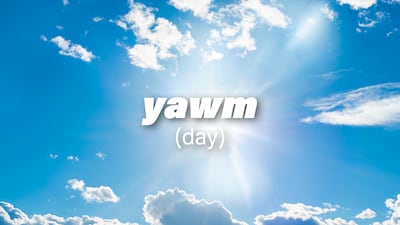In Shakespeare’s play Hamlet, King Claudius’s chief minister, Polonius, gives a speech to his son Laertes, advising him on how he should behave while at university. While full of memorable quotes, the speech ends with its most profound statement.
“This above all: To thine own self be true, and it must follow, as the night the day, thou canst not then be false to any man.”
Polonius’s advice to his son here is that if he is true and honest to himself, he won’t need to lie to anybody else. The quote is a powerful statement; Polonius estimates this state of living in one's own truth as a necessity, as a fundamental truth, “as the night, as the day”.
This week’s Arabic Word of the Week is a fundamental universal truth – tangible, scientific but also connected with ideas of longing.
Yawm, which simply means day, is a reality that most people take for granted in how it shapes our lives.
The word yawm is a noun, derived from the three Arabic letters, yah, wow and meem.
It is a set amount of time, measured from when the Sun rises to when it sets. From a scientific perspective, the day signifies the measurement of time when the Earth rotates around itself.
Al yawm can mean "today", "the day" or "any known day". The plural of yawm is ayaam and can literally mean “several days” but is also used to mean a long, abstract amount of time.
Many variants of the word yawm refer to actions that can occur daily.
Youmee or youmeea is a noun that refers to anything that occurs daily, for example, someone who goes to workor when a farmer feeds his animals. Yawama is a verb, not often used, but refers to an action that occurs daily, for example, the action of an employer paying his employee their wages daily would be referred to as yawama.
Youmiyat means any form of a diary where a record is kept. This can relate to one's own personal thoughts and feelings or an official record in a professional setting, such as a captain keeping a log of events during a sea voyage.
As would be expected, the concept of the word "day" has long been a great source of inspiration in various creative works exploring the theme of love, with the plural ayaam often expressing the ideas of longing and waiting.
Renowned Egyptian singer and actor Abdel Halim Hafiz had several hits whose titles had the word or variations of the word youm. These include Fi Youm, Fi Shahr, Fi Sana, (In a Day, In a Month, In a Year) released in 1959 and Fi Youm Min El Ayaam (One of These Days) from his film Al Wessada Al Khalia (The Empty Pillow) released in 1957.
Hafiz also starred in the hugely popular film Youm Min Omri (A Day From My Life), released in 1961, alongside actress Zubida Tharwat. The film follows Hafiz’s character Salah, a reporter who begins a love affair with the subject of his first major newspaper story, a young heiress who is being forced into an arranged marriage.
Lebanese singer Fairuz has two popular songs themed around the day – Akher Ayam El Saifeye (The Last Days of Summer) released in 1975 and Sanarjou Yawman (We Shall Return Someday).
Moroccan singer Samira Said also released the huge pop hit Youm Wara Youm (Day after Day) in 2002.











































































